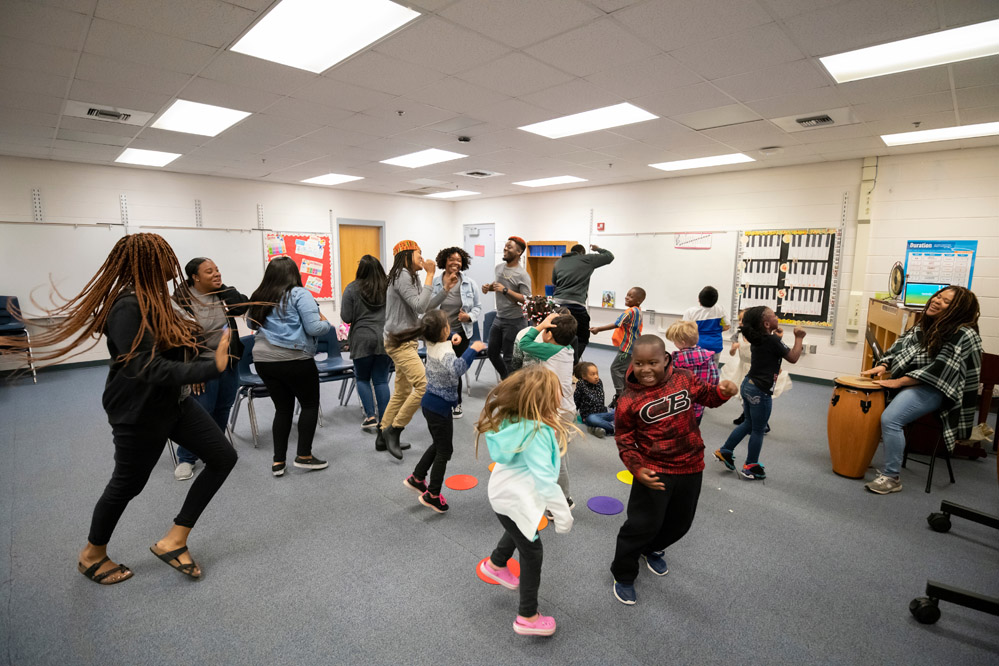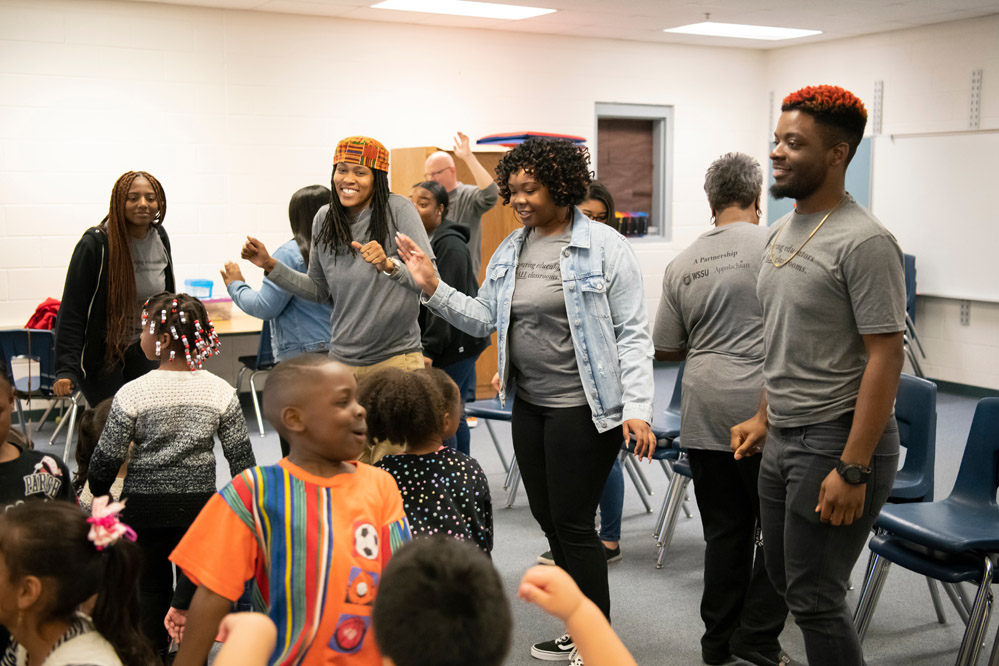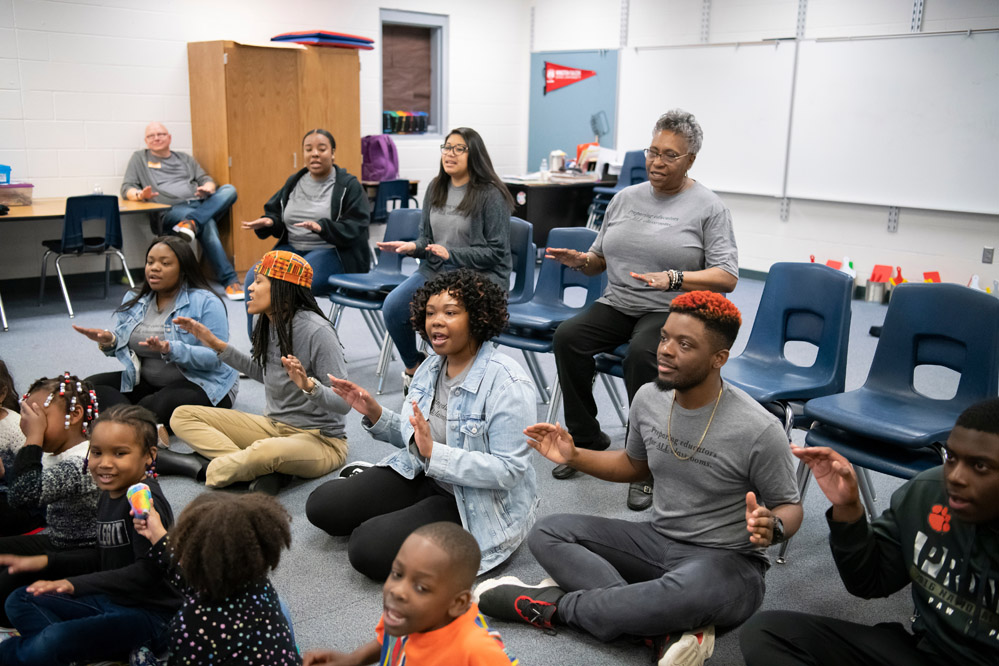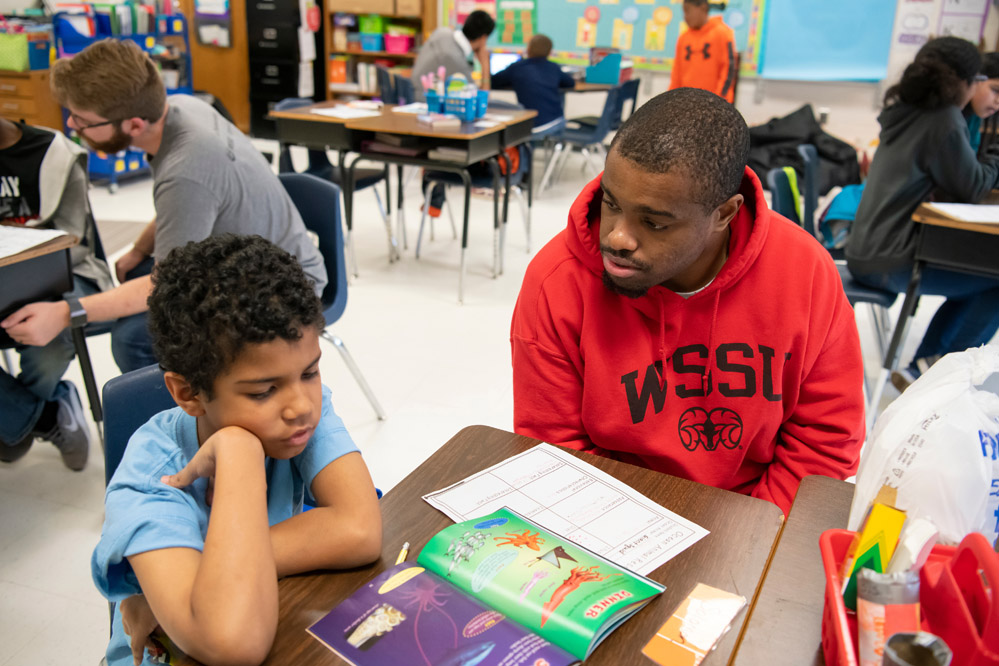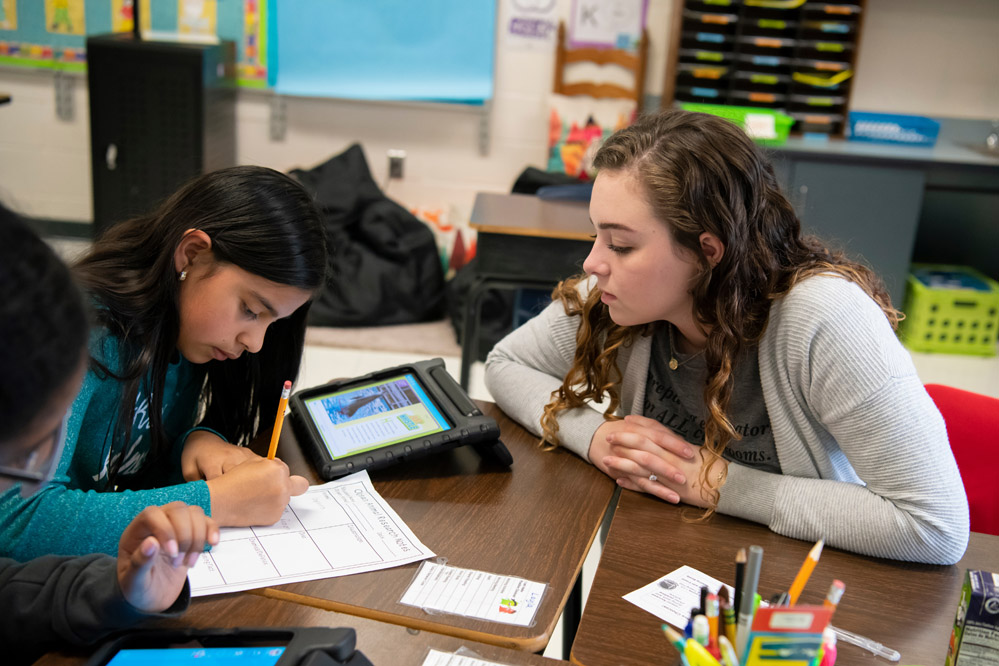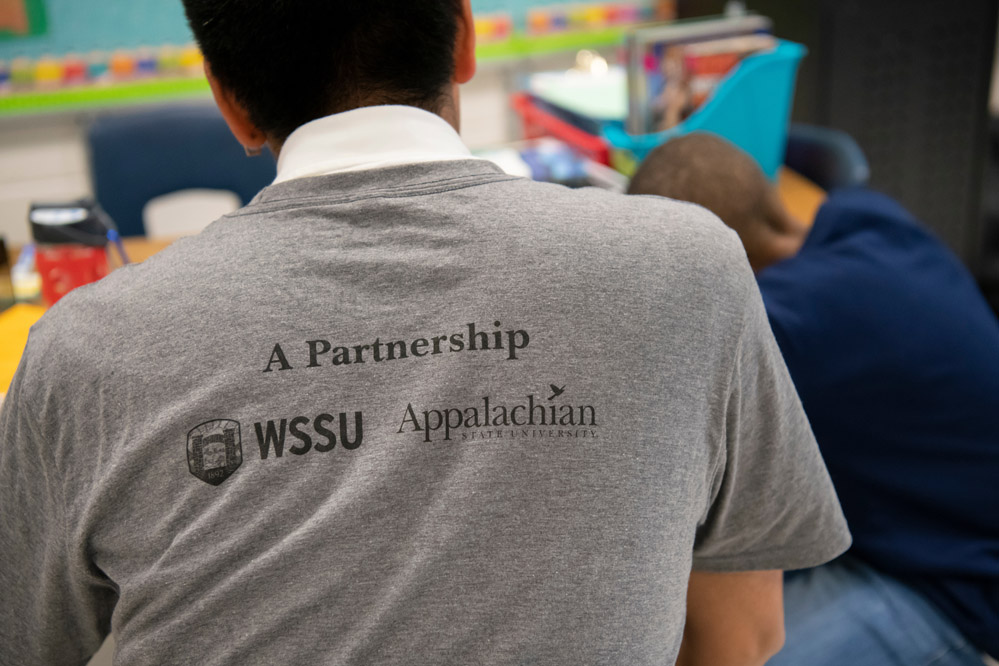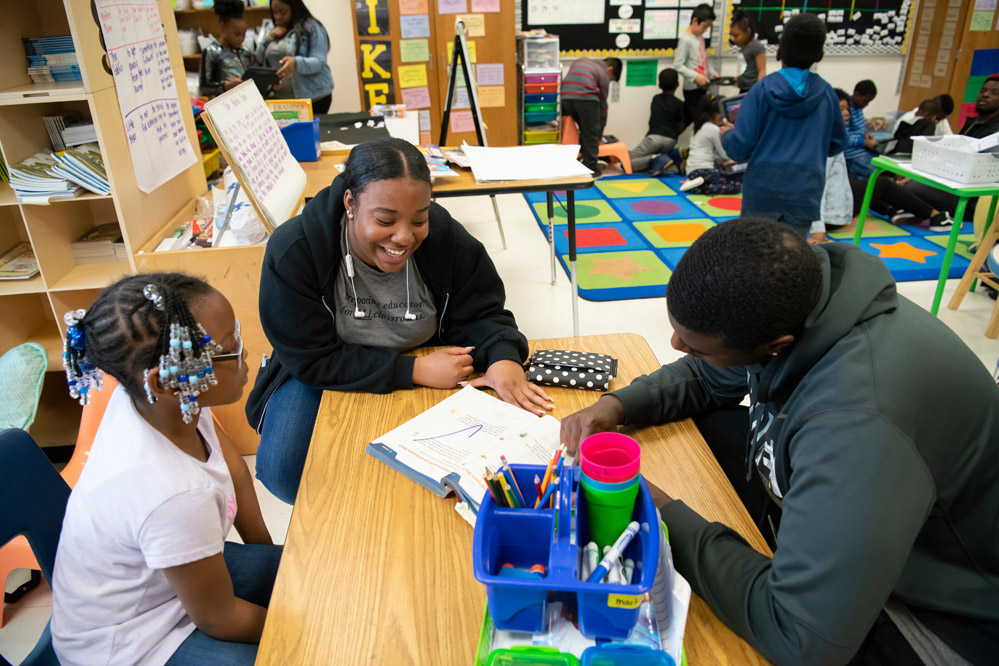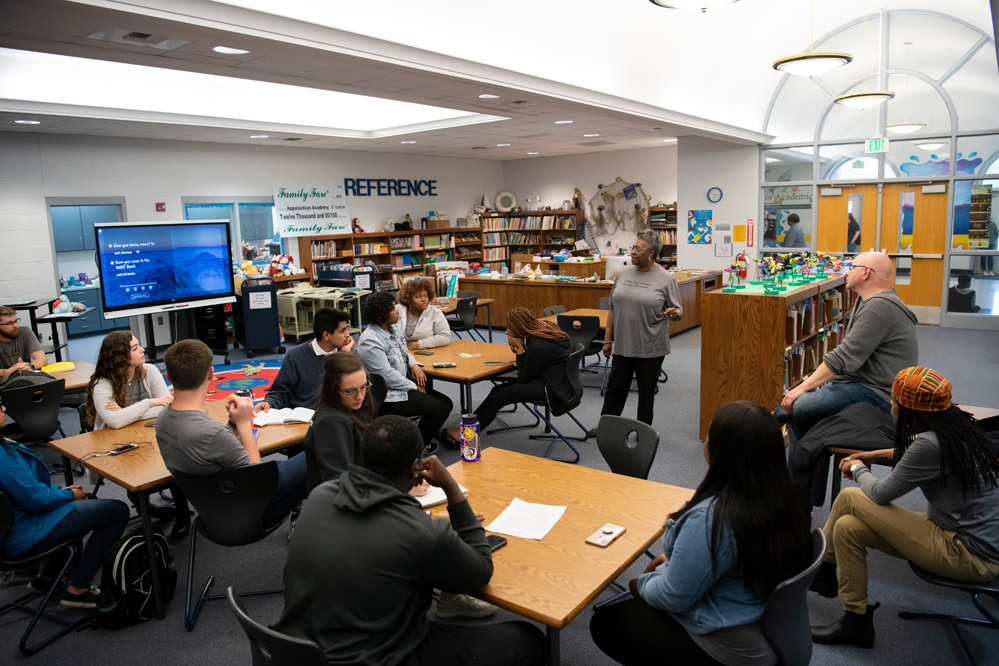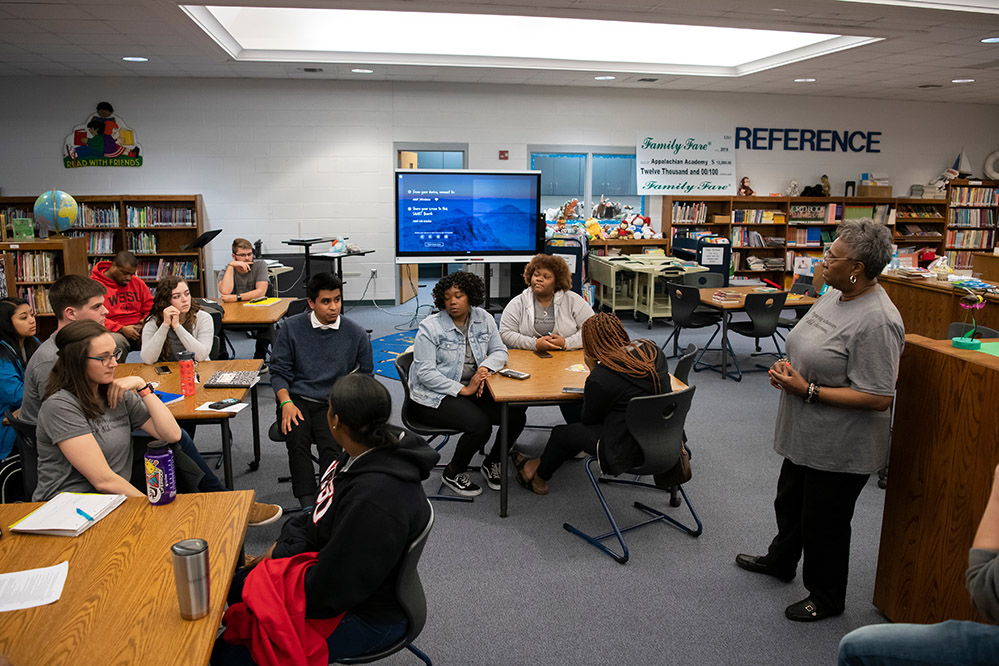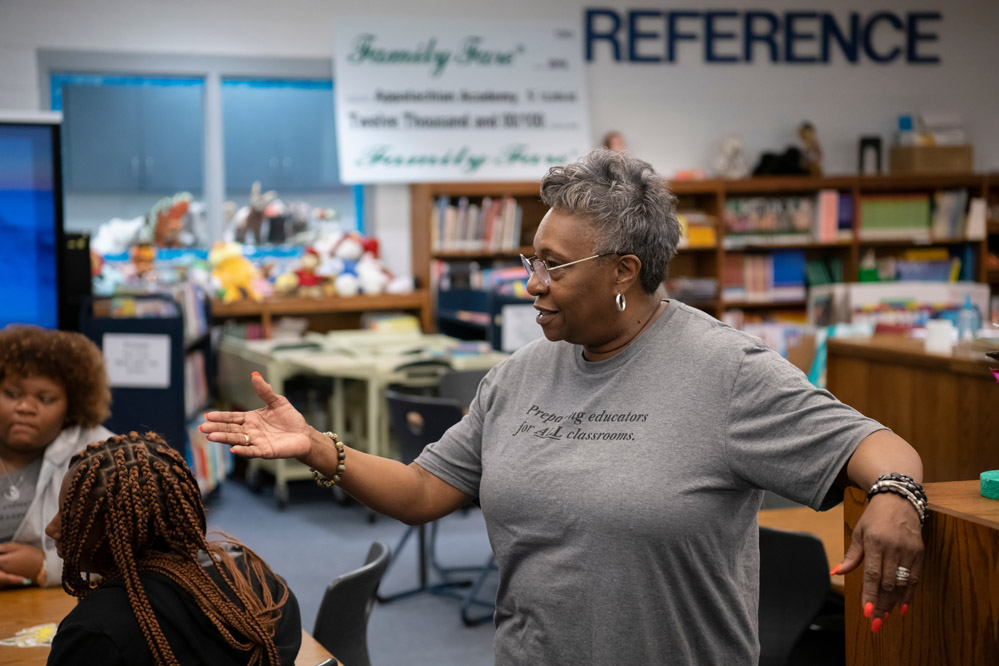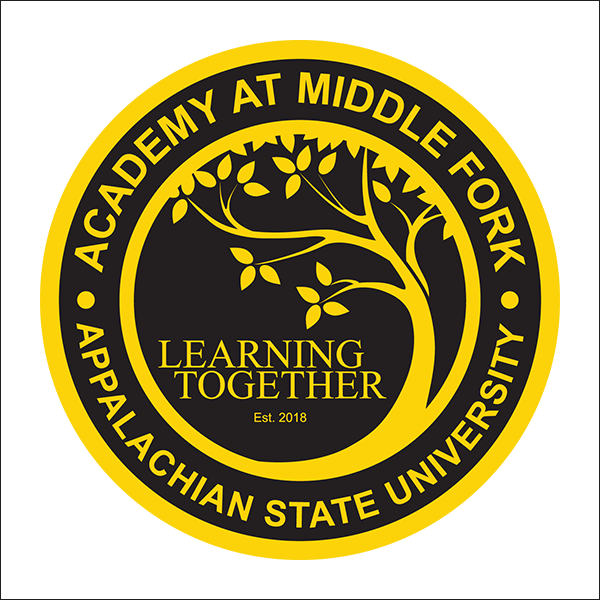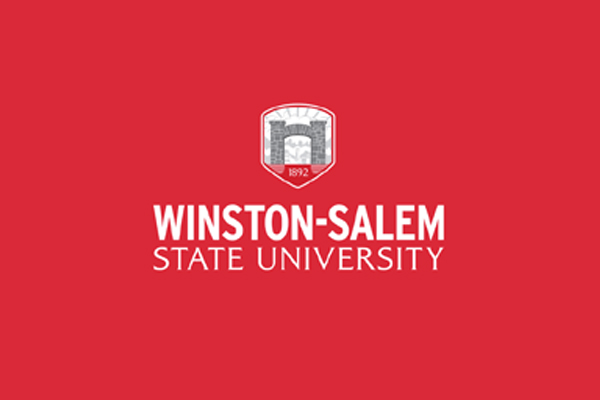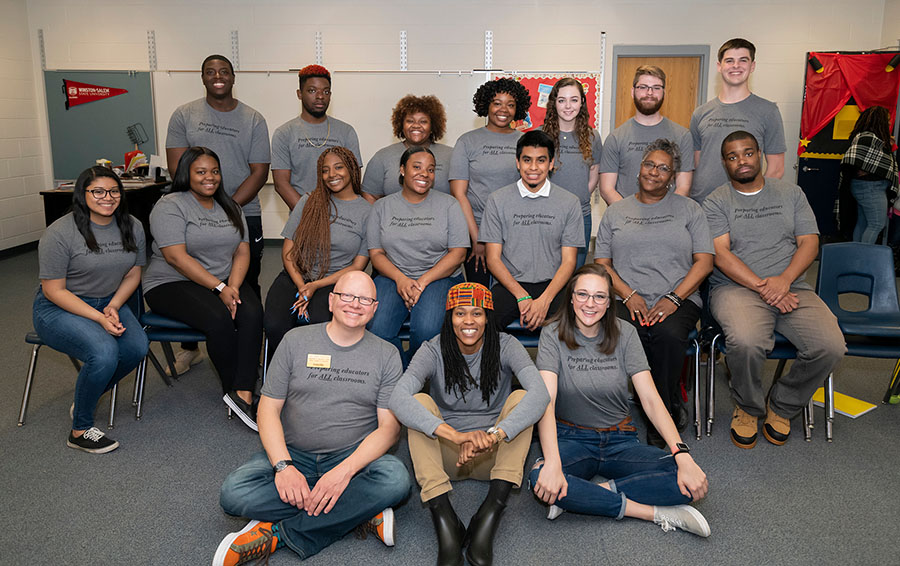
Students from Appalachian State University and Winston-Salem State University (WSSU) spend a day at the Appalachian State University Academy Middle Fork in Forsyth County as part of the social justice in education program created through the universities’ partnership. Pictured, from left to right, in front row: Dr. Chris Osmond, associate professor in Appalachian’s Department of Leadership and Educational Studies and associate director of the Reich College of Education’s doctoral program in educational leadership; WSSU student Trabeca Hughes; and Nadia Punt, a junior mathematics major from Statesville. Pictured, from left to right, in middle row: Micah Minnick, a senior special education major from Raleigh; WSSU students Lavana Johnson, Mia Marshall and Josephine Cameron; Adam Ortega, a senior English, secondary education major from Wilmington; Dr. Fran Bates Oates ’77 ’79 ’15, director of WSSU’s Office of Field and Clinical Experiences; and WSSU student Marcus Spann. Pictured, from left to right, back row: WSSU students Joel Carmichel, Reid Lee, Jasmine Peace and Tenasia Nelson; Katie Brewer, a junior elementary education major from Raeford; Winn Williams, a junior history, social studies education major from Morgantown; and Rett Hill, a junior middle grades education major with concentrations in language arts and mathematics from Richmond, Virginia. Photo by Garrett Garms/Winston-Salem State University
BOONE, N.C. — A new program is helping future educators at two North Carolina universities — Appalachian State University and Winston-Salem State University (WSSU) — look at classrooms in a different way, with the goal of creating an environment in which all students thrive.
Student diversity is increasing nationally and in North Carolina, according to the Western Interstate Commission for Higher Education (WICHE). Research in the journal Education Next shows that teachers’ biases — both explicit and implicit — affect the way they perceive their students, impacting the expectations they hold for diverse students, the amount of attention they give individual students and their discretionary disciplinary practices.
Considering these facts, Dr. Fran Bates Oates ’77 ’79 ’15 — director of the Office of Field and Clinical Experiences in WSSU’s Department of Education and an alumna of both Appalachian and WSSU — initiated a collaborative social justice program between her alma maters.
Social justice dispositions of educators has been an interest of Oates’ — in 2016 she was awarded Appalachian’s Alice Phoebe Naylor Outstanding Dissertation Award for her dissertation about the relational and institutional impact of historically black colleges and universities (HBCUs) on the social justice dispositions of white female education graduates.
Oates designed the program with Dr. Chris Osmond, associate professor in Appalachian’s Department of Leadership and Educational Studies, and Dr. Nickolas Jordan, associate professor in Appalachian’s Department of Human Development and Psychological Counseling.
Launched in the 2019 spring semester, the program partnered Appalachian’s Reich College of Education (RCOE) and WSSU’s Department of Education to help future teachers develop social justice dispositions while exploring school and community diversity.
“My goal has always been to cause a ripple effect of social justice disposition and self-reflection across our communities,” Oates said. “The students are now ready to look at their professions and their future classrooms in a different way.”
Twenty students, 10 from each university, participated in the program’s field course, which included the following:
- A session on recognizing implicit bias — the attitudes or stereotypes that affect one’s understanding, actions and decisions in an unconscious manner.
- A day at Bethel Elementary in Watauga County — a rural mountain school — that included a tour of the school, classroom visits, observations, lunch with students and a discussion with school principal and Appalachian alumnus Brian Bettis ’05 ’08.
- A visit to Appalachian’s laboratory K–5 school, the Appalachian State University Academy at Middle Fork — an urban school in Forsyth County. While at the academy, the students engaged in activities similar to those they took part in at Bethel Elementary.
- Open discussions on social justice and sharing experiences, conducted during campus visits to Appalachian and WSSU.
Based on the positive results and feedback from the students, the universities plan to continue the program in spring 2020.
Photos by Garrett Garms/Winston-Salem State University
Meaningful outcomes
“From the first day, the Appalachian and WSSU students were interested in learning about each other and forming real friend connections,” Osmond shared. “As we visited Bethel Elementary and the Academy at Middle Fork, and as we talked and reflected, the students showed a willingness to share their deep stories of implicit and explicit bias toward those different from themselves, where they learned them and how they were working to overcome them.”
Several of the students said they became more aware of and learned to identify their own implicit biases.
Appalachian student Claire Garcia, a junior middle grades education major from Asheville, said, “Learning more about the experiences of others was humbling and insightful. We should always continue to seek one another’s truths to establish community.”
Trabeca Hughes, a WSSU senior majoring in Africana studies and middle grades education, said the course allowed her to interact with people from varied backgrounds and upbringings.
“I know this experience and the knowledge I obtained will not only positively affect my teaching performance, but positively affect every interaction I have with children while promoting, implementing and providing an open, accepting, inclusive, safe and trustworthy environment inside and outside the classroom,” she said.
Adam Ortega, an Appalachian senior from Wilmington majoring in English, secondary education, said being able to openly discuss his thoughts and opinions on matters of social integrity with other students in the program gave him peace of mind as he discovered others shared his struggles and sentiments, and that he is “proactive in matters regarding social equity.”
“Keeping what I have learned, observed and questioned, I hope to provide an equitable classroom for all my students . . . where the students will become more tolerant and understanding of the diversities of their peers around them,” Ortega said. “I will provide a brave space in my classroom where every student’s individuality and background are respected, and no one feels excluded or marginalized.”
Iavana Johnson, a WSSU senior from Red Springs majoring in birth-kindergarten education, said she realized during the program that she is capable of teaching and inspiring students regardless of their socio-economic status. “From my colleagues, I learned different perspectives and approaches, allowing students to obtain the education they need to succeed.”
“The impact of experiences like this on our students’ future classrooms will be immense,” Osmond said. “Teacher dispositions are a powerful factor in student success that every teacher, at every level, can work to manage, control and change.”
What do you think?
Share your feedback on this story.
About the Department of Leadership and Educational Studies
The Department of Leadership and Educational Studies at Appalachian State University prepares traditional and nontraditional students to assume educational leadership roles in community colleges, universities, public schools, public libraries and related educational settings through active scholarship, reflection, professional discourse and interdisciplinary programs of study based on the integration of theory and practice. The department, housed in App State's Reich College of Education, offers a doctoral program in educational leadership, as well as support courses in educational foundations and research. Learn more at https://les.appstate.edu.
About the Reich College of Education
Appalachian State University offers one of the largest undergraduate teacher preparation programs in North Carolina, graduating about 500 teachers a year. The Reich College of Education enrolls more than 2,000 students in its bachelor’s, master’s, education specialist and doctoral degree programs, with offerings that span multiple fields — from teacher preparation, counseling, and therapy, to higher education, school and student affairs administration, library science, educational leadership and more. With over 10,000 alumni employed in North Carolina public schools, there is at least one Reich College graduate in every county in the state. Learn more at https://rcoe.appstate.edu.
About the Academy at Middle Fork
The Appalachian State University Academy at Middle Fork, located in Walkertown, North Carolina, serves approximately 300 K–5 students. The academy provides a balanced education through the implementation of research-based practices, state-of-the-art literacy instruction, and exemplary classroom instruction and administration. Learn more at https://middlefork.appstate.edu.
About Appalachian State University
As a premier public institution, Appalachian State University prepares students to lead purposeful lives. App State is one of 17 campuses in the University of North Carolina System, with a national reputation for innovative teaching and opening access to a high-quality, cost-effective education. The university enrolls more than 21,000 students, has a low student-to-faculty ratio and offers more than 150 undergraduate and 80 graduate majors at its Boone and Hickory campuses and through App State Online. Learn more at https://www.appstate.edu.
